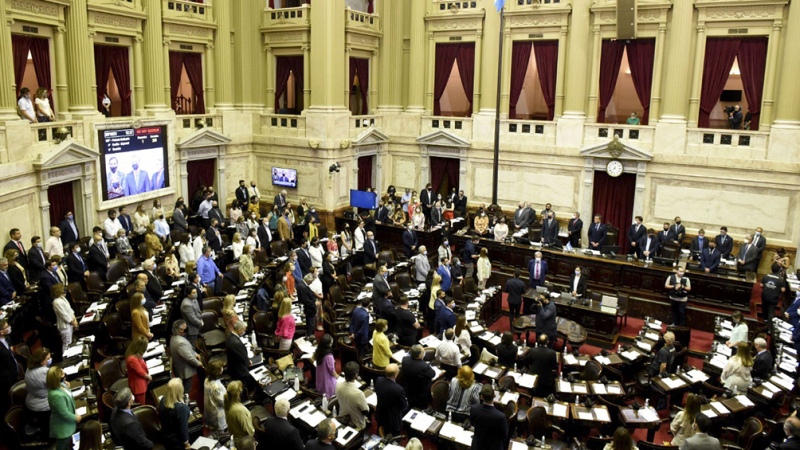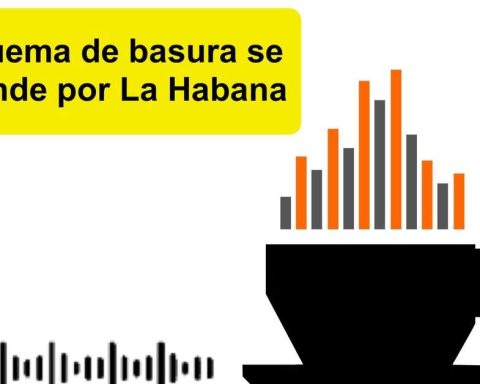Two weeks ago the block led by Mximo Kirchner did not achieve a quorum to meet. Photo: Daniel Dabove.
The Chamber of Deputies tonight signed into law the frontal food labeling project, designed to warn consumers about excess fat, sodium and sugar in products in order to help combat obesity, hypertension and the risks cardiac.
The project added 200 votes in favor; 22 against and 16 abstentions, while 18 deputies were absent at the time of the vote.
The initiative began to be debated after 4 p.m. and its analysis was exhausted after 11 p.m., after the intervention of more than 70 deputies, who participated in the first face-to-face meeting after the mixed work methodology applied during the first months of the Covid pandemic. .
When opening the treatment of the project, the president of the General Legislation Commission, Cecilia Moreau (Frente de Todos), affirmed that “the Argentine State is not going to look the other way” in a context of “chronic non-communicable diseases” such as obesity, hypertension and heart problems, which affect its population and can be prevented through diet.
For this reason, he stressed the importance of highlighting the nutritional information on the labels of food products, because today many “are illegible.”

In plenary, the lower house reaches full presence. Photo: Daniel Dabove.
His blockmate, Liliana Schwindt, considered the law as a “milestone for consumers and users”, but also “for Argentine food production.”
“This law is to put consumers on top, who for years have been demanding clear, accurate and truthful information,” he said.
From his position as president of the Health Commission and with his membership in the Front of All, Pablo Yedlin from Tucumán showed his partial differences: “Sugar is not a poison, it is a natural product. Many sweeteners, instead, will have to explain how They are healthy. We are going to accompany the project by proposing improvements. “
Also from Tucumán Beatriz Vila (Social Justice Front) warned that the labeling color “black refers to the idea of death”, and said: “This front labeling law, as it is, will generate more poverty and higher unemployment for the region. I believe that all the deputies of the region must unite and make a better law, which does not leave the regional economies. “
The project added 200 votes in favor; 22 against and 16 abstentions“
For the Missionary Concord Front, Flavia Morales gave another point of view: “There are issues that affect the province of Misiones with herb and tea, but we are going to follow the law and we hope that the regulations can be fixed.”
From another provincial space, the doctor Luis Di Gicomo, from Juntos Somos Ro Negro, remarked: “This law is more than welcome. Data kill story; according to scientific studies, in Uruguay there were modifications in purchasing decisions based on the labeling and in Chile there was no decrease in work from this measure as many say “.
The deputy of Together for Change Brenda Austin (UCR) celebrated the treatment of this law that “demolishes myths” and stressed that she managed not to “have fallen into the crack”, but rather to ponder the “defense of the right to health.”

Photo: Daniel Dabove.
“This law is necessary because we are facing a great epidemic: that of overweight,” he said, and thanked civil society organizations that “helped support with evidence, information and actions that debunked myths.”
On the other hand, PRO deputy Carmen Polledo criticized the initiative by stating that “a comprehensive and complete labeling system should be considered” and said that for that reason an alternative was proposed in an opinion that meets the purpose of modify eating habits “.
The closing of the debate was in charge of the Kirchnerist Florencia Lampreabe, who highlighted: “This law is a tool of food sovereignty. Behind what we consume, there is also the production model that we encourage. In order to decide, you must first know, a condition that today is clouded because companies do not go straight ahead and hide basic information ”.
“This law is to put consumers on top, who for years have been demanding clear, accurate and truthful information”,“
Liliana schwindt
She was preceded by the radical Alejandro Cacace, who argued: “There is an enormous increase in obesity, a prevalence of excess weight, a very clear and abundant evidence that marks the relationship between the increase in processed and ultra-processed foods with this phenomenon. obesity and excess weight and the relationship it has with non-communicable diseases, with the prevalence of cardiac and respiratory diseases, cancer and diabetes ”.

Photo: Daniel Dabove.
In that sense, he asked himself: “So what are we waiting for to regulate this health problem?”
The treatment of the project began with a delay of more than three hours due to the fact that several legislators, mostly from Together for Change, presented requests to deviate from the regulation to include other issues, although these requests were rejected in their entirety and it was maintained. the agenda agreed between the political blocs.
The session, which began at 12.35, was observed by different civil society organizations that have been requesting the approval of the frontal labeling law so that society knows the excesses of fats, sodium and sugars that some food products have. .
The majority ruling provides for the incorporation on the front of the packages of ultra-processed products a label in the shape of a black octagon with white letters that warns of the excess of nutrients critical to health, such as sugars, sodium, saturated fats, total fats and calories. .
In addition, it determines that the products that contain among their sweetening ingredients or caffeine will have to inform that their consumption is not recommended in girls and boys.

Photo: Daniel Dabove.
On the other hand, the bill establishes the prohibition of issuing commercial advertising – aimed at boys, girls and adolescents – of products with warning stamps.
In addition, it provides that products that have more than one warning seal may not include cartoons, characters, public figures, gifts, or items that attract the attention of children and adolescents.
On the other hand, it determines that, under the same conditions, the State must prioritize the purchase of food without these warning stamps.


















